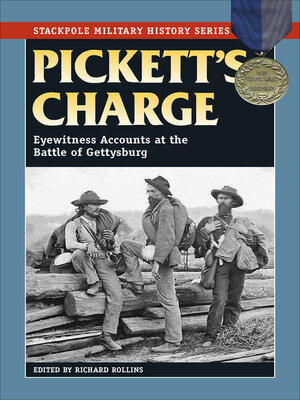Pickett's Charge
ebook ∣ Eyewitness Accounts at the Battle of Gettysburg · Stackpole Military History
By Richard Rollins

Sign up to save your library
With an OverDrive account, you can save your favorite libraries for at-a-glance information about availability. Find out more about OverDrive accounts.
Find this title in Libby, the library reading app by OverDrive.



Search for a digital library with this title
Title found at these libraries:
| Library Name | Distance |
|---|---|
| Loading... |
Constructed from first person accounts from Union and Confederate officers and soldiers, this military history is perfect for Civil War buffs.
At Gettysburg on July 3, 1863, Confederate soldiers launched one of history’s most famous infantry assaults: Pickett's Charge. Using the participants’ own words, Richard Rollins deftly reconstructs that momentous event. Separate sections cover planning and preparation; the preliminary artillery barrage; the charges of Pickett's, Pettigrew's, and Trimble's Divisions; and defensive actions up and down the Federal line. From the generals who devised the assault to the lower-level officers and men who bravely walked through shell and shot, Rollins offers a comprehensive, panoramic view of the charge, with more than 150 firsthand accounts—including accounts from Lee, Longstreet, Pickett, Meade, and Hancock—many of them long forgotten and previously unpublished.
At Gettysburg on July 3, 1863, Confederate soldiers launched one of history’s most famous infantry assaults: Pickett's Charge. Using the participants’ own words, Richard Rollins deftly reconstructs that momentous event. Separate sections cover planning and preparation; the preliminary artillery barrage; the charges of Pickett's, Pettigrew's, and Trimble's Divisions; and defensive actions up and down the Federal line. From the generals who devised the assault to the lower-level officers and men who bravely walked through shell and shot, Rollins offers a comprehensive, panoramic view of the charge, with more than 150 firsthand accounts—including accounts from Lee, Longstreet, Pickett, Meade, and Hancock—many of them long forgotten and previously unpublished.







